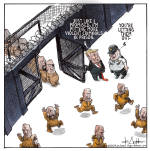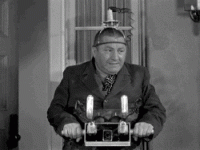signalmankenneth
Verified User
Even though President Donald Trump had vowed to deliver pardons to those who participated in the Jan. 6, 2021, siege of the Capitol, his sweeping clemency for roughly 1,500 people was stunning.
The recipients of Trump’s incredible generosity included Enrique Tarrio, a onetime leader of the Proud Boys who was convicted of sedition and serving a 22-year sentence; Stewart Rhodes, the founder of the Oath Keepers, who was serving an 18-year sentence for his involvement; and about 600 people who had been charged with assaulting or resisting law enforcement officers, including more than 170 who were charged with using a deadly or dangerous weapon or seriously injuring an officer. Plenty of people were convicted of nonviolent offenses, but the notion that Jan. 6 was peaceful or a “day of love,” as Trump called it, is an abject lie.
If history is any guide, this is not likely to be the last time that you hear about these people.
Trump promised to “free” the Jan. 6 defendants on his first day back in office, and he has now followed through on that promise. But this will not be a one-day story, and Trump — and the Republican Party — may come to regret the political costs of this decision.
For starters, Trump’s blanket pardon is unpopular, and it could help to frame early perceptions of his return to the White House. After the election, multiple polls reported that somewhere around two-thirds of Americans opposed Trump’s promise to pardon the Jan. 6 defendants, including about two-thirds of independents.
It is not hard to understand why: Despite the best efforts of Trump and many of his political allies, most Americans have not forgotten about what happened that day, and most Americans have rejected the fantasyland version of events that Trump has sought to portray. That is why Trump’s approval rating collapsed after Jan. 6, even though it has since recovered. That is why surveys showed most Americans wanted Trump to stand trial in Washington in the Justice Department’s prosecution alleging that he tried to steal the 2020 election in the run-up to the Jan. 6 riot. That is why most Americans repeatedly told pollsters that they thought Trump was guilty of criminal conduct. And that is why about half of the country said that Trump should have gone to prison if he had been convicted in the election subversion case.
In the wake of the election, many Republicans have tried to claim that the results were somehow an all-purpose vindication of Trump and a repudiation of the Justice Department’s long-delayed efforts to hold Trump accountable for his alleged misconduct in connection with the 2020 election. The much better explanation is that a critical mass of voters — rather than signing on to Trump’s claims on this point — decided to vote for him because they did not like the direction of the country under the Biden-Harris administration. These positions may seem to be in tension or perhaps even irrational, but they are not.
Trump’s mass pardon has also created a political problem for many of his fellow Republicans. He has once again cut the legs out from under his own vice president, who said less than two weeks ago, “If you committed violence on that day, obviously you shouldn’t be pardoned.” Plenty of other Republicans took the same position that JD Vance did and will now have to twist themselves into knots explaining their past comments and their vocal defenses of Trump, who has once again made them look credulous and foolish.
That is just the short-term fallout. The potential for political backlash will linger for months and years to come. That’s because the Jan. 6 defendants are not just going to evaporate into society.
Trump has once again sent a disturbing message to his supporters: If you engage in political violence on my behalf, I will protect you. Tarrio, Rhodes and their associates should feel emboldened, and there is no telling what they will do with Trump now firmly behind them.
Even setting aside the prospect of further political violence, you can safely expect a fair amount of recidivism among those who were convicted — particularly the defendants convicted of violent conduct. That means that we may see and read stories in the years to come involving Jan. 6 defendants pardoned by Trump who went on to commit more — and potentially more serious — crimes.
https://www.yahoo.com/news/why-trump-could-regret-jan-100000706.html

The recipients of Trump’s incredible generosity included Enrique Tarrio, a onetime leader of the Proud Boys who was convicted of sedition and serving a 22-year sentence; Stewart Rhodes, the founder of the Oath Keepers, who was serving an 18-year sentence for his involvement; and about 600 people who had been charged with assaulting or resisting law enforcement officers, including more than 170 who were charged with using a deadly or dangerous weapon or seriously injuring an officer. Plenty of people were convicted of nonviolent offenses, but the notion that Jan. 6 was peaceful or a “day of love,” as Trump called it, is an abject lie.
If history is any guide, this is not likely to be the last time that you hear about these people.
Trump promised to “free” the Jan. 6 defendants on his first day back in office, and he has now followed through on that promise. But this will not be a one-day story, and Trump — and the Republican Party — may come to regret the political costs of this decision.
For starters, Trump’s blanket pardon is unpopular, and it could help to frame early perceptions of his return to the White House. After the election, multiple polls reported that somewhere around two-thirds of Americans opposed Trump’s promise to pardon the Jan. 6 defendants, including about two-thirds of independents.
It is not hard to understand why: Despite the best efforts of Trump and many of his political allies, most Americans have not forgotten about what happened that day, and most Americans have rejected the fantasyland version of events that Trump has sought to portray. That is why Trump’s approval rating collapsed after Jan. 6, even though it has since recovered. That is why surveys showed most Americans wanted Trump to stand trial in Washington in the Justice Department’s prosecution alleging that he tried to steal the 2020 election in the run-up to the Jan. 6 riot. That is why most Americans repeatedly told pollsters that they thought Trump was guilty of criminal conduct. And that is why about half of the country said that Trump should have gone to prison if he had been convicted in the election subversion case.
In the wake of the election, many Republicans have tried to claim that the results were somehow an all-purpose vindication of Trump and a repudiation of the Justice Department’s long-delayed efforts to hold Trump accountable for his alleged misconduct in connection with the 2020 election. The much better explanation is that a critical mass of voters — rather than signing on to Trump’s claims on this point — decided to vote for him because they did not like the direction of the country under the Biden-Harris administration. These positions may seem to be in tension or perhaps even irrational, but they are not.
Trump’s mass pardon has also created a political problem for many of his fellow Republicans. He has once again cut the legs out from under his own vice president, who said less than two weeks ago, “If you committed violence on that day, obviously you shouldn’t be pardoned.” Plenty of other Republicans took the same position that JD Vance did and will now have to twist themselves into knots explaining their past comments and their vocal defenses of Trump, who has once again made them look credulous and foolish.
That is just the short-term fallout. The potential for political backlash will linger for months and years to come. That’s because the Jan. 6 defendants are not just going to evaporate into society.
Trump has once again sent a disturbing message to his supporters: If you engage in political violence on my behalf, I will protect you. Tarrio, Rhodes and their associates should feel emboldened, and there is no telling what they will do with Trump now firmly behind them.
Even setting aside the prospect of further political violence, you can safely expect a fair amount of recidivism among those who were convicted — particularly the defendants convicted of violent conduct. That means that we may see and read stories in the years to come involving Jan. 6 defendants pardoned by Trump who went on to commit more — and potentially more serious — crimes.
https://www.yahoo.com/news/why-trump-could-regret-jan-100000706.html
TRUMP PROMISES TO PUT CRIMINALS IN PRISON






